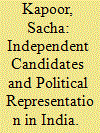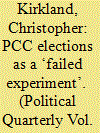| Srl | Item |
| 1 |
ID:
160563


|
|
|
|
|
| Summary/Abstract |
We estimate the causal effect of independent candidates on voter turnout and election outcomes in India. To do this, we exploit exogenous changes in the entry deposit candidates pay for their participation in the political process, changes that disproportionately excluded candidates with no affiliation to established political parties. A one standard deviation increase in the number of independent candidates increases voter turnout by more than 6 percentage points, as some voters choose to vote rather than stay home. The vote share of independent candidates increases by more than 10 percentage points, as some existing voters switch who they vote for. Thus, independents allow winning candidates to win with less vote share, decrease the probability of electing a candidate from the governing coalition by about 31 percentage points, and ultimately increase the probability of electing an ethnic-party candidate. Altogether, the results imply that the price of participation by independents is constituency representation in government.
|
|
|
|
|
|
|
|
|
|
|
|
|
|
|
|
| 2 |
ID:
095875


|
|
|
|
|
| Publication |
2010.
|
| Summary/Abstract |
Previous studies of China's local people's congress (LPC) elections have been preoccupied with the description of the new election law, the operation of that law, the control mechanism of local Chinese Communist Party (CCP) committees in the electoral process, electorates and selectorates, and the voting behavior in China's limited-choice election. Less scholarly attention has been paid to the emergence and implications of independent candidates in this electoral setting. Based on interviews, document analysis and observation, this paper defines the independent candidate, classifies them into four types, and describes the campaign process and specific outcomes in China's LPC elections. It is demonstrated that the development of independent candidates forms a realistic power locus in China's LPC elections, and to a large extent provides a functional substitution of opposition parties for exploring the change of authoritarian regime without opposition parties.
|
|
|
|
|
|
|
|
|
|
|
|
|
|
|
|
| 3 |
ID:
120398


|
|
|
|
|
| Publication |
2013.
|
| Summary/Abstract |
This paper examines the origin and historical development of independent candidates in People's Congress elections of mainland China. It discusses the motives and strategies of independent candidates, and how the Party-state copes with the growing independent candidate movement.
|
|
|
|
|
|
|
|
|
|
|
|
|
|
|
|
| 4 |
ID:
140857


|
|
|
|
|
| Summary/Abstract |
The low turnout of the 2012 police and crime commissioner (PCC) elections have led to questions surrounding their legitimacy and have even led to the former Deputy Prime Minister Nick Clegg describing the elections—elections his party helped to introduce—as a ‘failed experiment’. Despite this, the election of a majority Conservative government in May 2015 appears to offer some longevity to the role of police and crime commissioners and cements next year's PCC elections in the political diary. Concerns in the immediate aftermath of the elections focused upon the costs of the elections. In this article I offer some suggestions as to what lessons could be learned from this experiment and, through exploring the attitudes of voters, political parties and the media, suggest that we can learn four lessons: (1) that spoilt ballots cannot be ignored; that (2) political parties and (3) the media's attitudes toward elections are important in encouraging people to vote; and (4) that high numbers of independent candidates cannot simply be welcomed at times of elections.
|
|
|
|
|
|
|
|
|
|
|
|
|
|
|
|